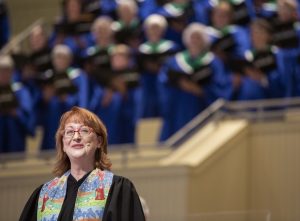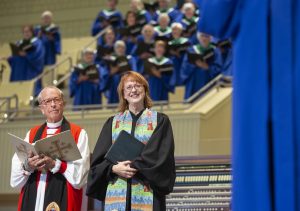
MHARI SHAW/STAFF PHOTOGRAPHER
“The title of my sermon is ‘A Star is Born,’ and I am not trying to do a mash-up of the three wise men and the movie,” said the Rev. Susan Sparks at the 9:15 a.m. Monday Ecumenical Service. Her Scripture text was Matthew 2:1-12, and the Advent theme was hope.
“I can’t see Mary as Lady Gaga or Barbra Streisand,” Sparks said, referring to the 2018 and 1976 versions of the movie “A Star is Born.” “I can’t see Kris Kristofferson as Joseph, and please don’t let Gary Busey be one of the wise men.”
Sparks talked about real stars in the sky.
“I live in New York City, and I hate that I can’t see the stars,” she said. “I grew up in the North Carolina mountains, and there was a canopy of sky and stars, and I loved to lie out in the grass at night to watch them.”
Stars bring humanity to a greater place, a higher place. Humanity has been drawn to the stars to try to understand itself. From Galileo to NASA, to the three wise men who were tracking a star to find the Christ child to lead them home, humanity has been drawn to the stars to find grounding.
“Stars are part of our organic heredity,” Sparks said. “I saw a National Geographic special that showed our bodies are made of the remnants of stars. We are made of stuff as old as the universe. As Joni Mitchell said, ‘we are stardust.’ ”
While humans have a literal connection to the stars, there is also a metaphorical one.
“Get ready, a liberal arts major is going to explain astrophysics,” Sparks said. “There are two stages to a star. The first is when a star is born, and it pulls gases into itself to set off a nuclear explosion so that it can begin to shine. The star pulls energy in, then radiates energy out. The second stage is when the center can’t hold and the star collapses in on itself and forms a black hole.”
If we are honest, she said to the congregation, “this sounds familiar.”
“We have been in both places: drawn to light and we radiate it, but sometimes the light goes out and we collapse and are drawn into a dark abyss,” Sparks said.
The only thing between radiating light and collapsing into a dark abyss is a strong center, she said, “a center that will hold.”
Sparks talked about the reality of the pain of the world versus the sometimes-insipid messages on Christmas cards.
“I see the pain of the world and then I look at a cherub on a Christmas card, pulling an old-time Radio Flyer wagon, saying ‘Joy to the World,’ ” she said. “What does a cherub know about credit card debt, living in a refugee camp, aging parents or the New York City subway in the summer?”

MHARI SHAW/STAFF PHOTOGRAPHER
But the reality of the world is harsh and volatile.
“We try to keep our heads above water and that is hard, especially if we try with a weak center,” Sparks said. “We look to our titles, our degrees, our bank accounts, even to other people to be that center, but we are looking in the wrong place.”
Sparks then told a story about a Baptist preacher who was down by the riverside, baptizing people. A man known to drink a little too much came by. The preacher grabbed him and dunked him in the water, and when he brought the man up again, the preacher asked, “Did you find Jesus?”
The man answered, “No.” The preacher dunked him two more times and each time asked, “Did you find Jesus?” After the third time, the man asked the preacher, “Are you sure this is where Jesus fell in?”
King Solomon, writing in Ecclesiastes, proclaimed all the great deeds he had done, all the gold he had acquired and then said, “This center can’t hold. All is vanity. I have been chasing the wind and nothing has been gained.”
“We are not so different,” Sparks said. “We may not plant a vineyard, but we definitely drink the harvest. What is earthly and superficial won’t last forever. That big house you built won’t last forever; Botox only lasts three months.”
Sparks said people need to be more like stars.
“My point is, we need light to stay bright and strong like a star, so we can find a star to lead us on and, like the wise men, to find the way home,” she said. “That little light of hope is born within us. It may not be bright sometimes, but it is still there. You need to keep your heart full of hope, the fuel of the Christ child.”

MHARI SHAW/STAFF PHOTOGRAPHER
Sparks and her husband, Toby, were friends of Ed Charles, who was part of the Mets baseball team in 1969. Part of Charles’ story was used in the film “42,” about Jackie Robinson.
Charles went to see Robinson play in Daytona Beach, Florida. Even though he sat in the segregated section, he saw what his parents had told him was true: “One of us made it.”
Charles and his friends followed Robinson to his train, ran after the train as long as they could see it and when they could not see it anymore, they put their ear to the track to hear the train through the rails.
“Robinson gave Ed the hope he needed, and Ed held onto it for dear life,” Sparks said. “Hold on to the light in the stars, to the Christ child, for dear life. When you can’t see, listen. When you can’t hear anymore, have faith.”
Sparks then posed a question to the congregation.
“What do you have in your center?” she asked. “Hold onto the center on good days and bad. If the light is starting to go out, go back outside and look at the stars, and remember that stars turn chaos into light. That light radiates power and a star led the wise men to the Christ child.”
She continued, “Draw energy, move toward light and warmth and pour it out into the world. Find a center that will hold and place it in your heart where a star is born. And all the people said, amen.”
The Rt. Rev. V. Gene Robinson, vice president of religion and senior pastor, presided. The Rev. Natalie Hanson, a retired Methodist minister and co-host of the United Methodist Missionary House at Chautauqua, read the Scriptures. The choral introit, sung by the Motet Choir, was “Love Came Down at Christmas,” arranged by Matthew Oltman with text by Christina Rossetti. For the anthem, the Motet Choir sang “Choose Something Like a Star,” by Randall Thompson, with words from a poem of the same name by Robert Frost. Jared Jacobsen, organist and coordinator of worship and sacred music, directed the choir. The Harold F. Reed Sr. Memorial Chaplaincy and the J. Everett Hall Chaplaincy provide support for this week’s services.




